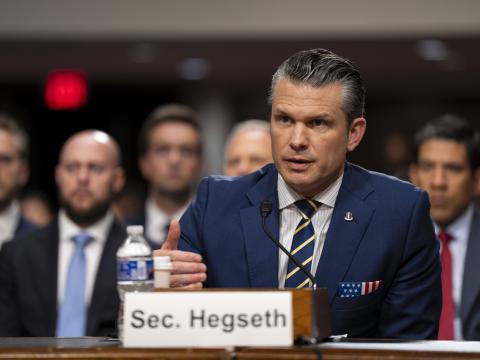Joint Leader Outlines Priorities for the Future
Gen. James N. Mattis, USMC, NATO Supreme Allied Commander Transformation, and commander, U.S. Joint Forces Command, opened the Joint Warfighting Conference in Virginia Beach, Virginia, stating that he comes to this event with a certain degree of urgency because the enemies also are gathering to discuss warfare. "We have to remember that we are at war right now," he stated. The U.S. and its allies are facing manifold threats, and nations must stay together in the fight.
Gen. James N. Mattis, USMC, NATO Supreme Allied Commander Transformation, and commander, U.S. Joint Forces Command, opened the Joint Warfighting Conference in Virginia Beach, Virginia, stating that he comes to this event with a certain degree of urgency because the enemies also are gathering to discuss warfare. "We have to remember that we are at war right now," he stated. The U.S. and its allies are facing manifold threats, and nations must stay together in the fight. "These enemies are maniacs, that's the best way for me to describe them," Gen. Mattis stated. We will have to figure out the best way to defend ourselves, he added.
The U.S. must accelerate the rate at which it is changing; if this does not happen, it will be like a ship moving at the speed of the current, staying in one place, he related. Reminding audience members that current and future wars will not have clearly defined beginnings or ends but rather be persistent conflict, the problems U.S. coalitions face are not new or more complex than those faced throughout history, so the need now for a grand strategy is an imperative. The Joint Operating Environment document, a strategy statement that currently is being updated, is one arm of this strategy focus; the other is the Capstone Concept for Joint Operations, which encapsulates some of the solutions. "No military in history has transformed without clearly identifying a strategy," the general said.
Protecting our way of life doesn't allow the U.S. and its allies to opt out of fighting simply because they do not like the way the enemy fights, Gen. Mattis stated. If military superiority falters in any way, enemies will take advantage of those weaknesses. "The character of war changes in every conflict," he said, "but the fundamentals of war stay the same." Because the military cannot predict the future, it must adapt, he added. One aspect of this adaptation is to break out of the Western world's way of thinking, he noted.
Hybrid threats with irregular warfare are here to stay, and the joint force must be prepared to fight them, Gen. Mattis stated. To this end, the general revealed that creating high-performing small troop units is a high priority. These units will be a combination of experts in areas such as joint intelligence and joint fires. However, these units also must be able to unite when they are required to fight large groups of adversaries. The Quadrennial Defense Review will address the goal of creating these units.
"The surprise will remain constant," Gen. Mattis said. "If we assume that the enemy has five courses of action, the enemy will do number six." This means that the military's professional military education must adapt quickly. Tactical leaders will operate guided only by commander's intent; this approach requires tactical technology, he added.
"We have not made any technology mistakes; we've made hundreds of human mistakes. We need more training. We need to look at the training and education for the youngest troops, and they must learn from the medical profession's oath: First, do no harm," the general stated.




Comments